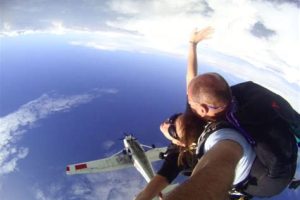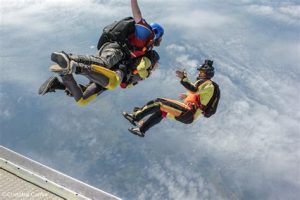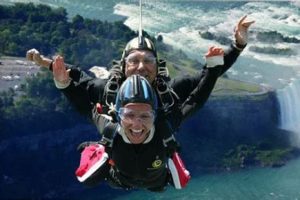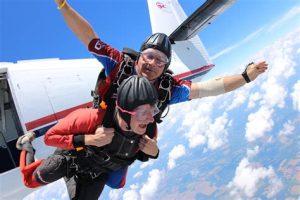Table of Contents
Tandem skydiving instructors earn a competitive salary for their thrilling job of guiding first-time jumpers through the exhilarating experience of skydiving. This metadescription explores the average income and earning potential of tandem skydiver instructors while highlighting the exciting nature of their work.
Are you ready to take the plunge into an exhilarating career? If you have a passion for adventure and a love for heights, then becoming a tandem skydiver might just be the perfect fit for you. Not only does this profession allow you to experience the thrill of freefalling through the sky, but it also offers a competitive salary that will leave you soaring with excitement. In this article, we will explore the world of tandem skydiving and delve into the financial rewards that come with this adrenaline-fueled job.
Introduction
Welcome to the world of tandem skydiving, where thrill-seekers from all walks of life come together to experience the ultimate adrenaline rush. But have you ever wondered how much a tandem skydiver makes for their daring feats? In this article, we will explore the salary of a tandem skydiver and shed light on the factors that influence their earnings.
The Role of a Tandem Skydiver
A tandem skydiver plays a crucial role in ensuring the safety and enjoyment of their clients during a skydiving experience. They are responsible for guiding and assisting first-time divers, operating the parachute system, and maintaining constant communication throughout the jump. Their expertise and ability to handle any unexpected situations make them an invaluable asset in this exhilarating adventure.
Training and Certification
To become a tandem skydiver, individuals must go through rigorous training and obtain the necessary certifications. This includes completing a certain number of solo jumps, attending courses on equipment operation and emergency procedures, and demonstrating proficiency in various skydiving techniques. The cost of training and certification can vary, depending on the location and the specific requirements of the training program.
Factors Affecting Salary
Several factors influence the salary of a tandem skydiver:
- Experience: Just like in any profession, experience plays a significant role in determining the income of a tandem skydiver. Those with more jumps under their belt and a solid track record are likely to command higher salaries.
- Location: The geographical location can greatly impact a tandem skydiver’s earnings. Popular tourist destinations with high demand for skydiving experiences often offer more lucrative opportunities compared to less frequented areas.
- Employment Type: Tandem skydivers can work in various settings, such as commercial drop zones, skydiving resorts, or even as freelancers. The type of employment can affect the salary structure and benefits received.
Salary Range
The salary range for tandem skydivers varies widely depending on the factors mentioned above. On average, a tandem skydiver can expect to earn anywhere between $25,000 to $60,000 per year. However, it is important to note that these figures can fluctuate significantly based on location and experience.
Additional Income Opportunities
While the base salary serves as a primary source of income for tandem skydivers, there are additional avenues for boosting their earnings:
- Video and Photography Services: Many tandem skydivers offer video and photography packages to capture their clients’ once-in-a-lifetime experience. This add-on service can generate extra income.
- Instructor Certifications: Tandem skydivers can pursue instructor certifications, allowing them to train aspiring skydivers. By becoming an instructor, they can expand their skill set and increase their earning potential.
Job Outlook
The job outlook for tandem skydivers remains positive, as the demand for thrilling adventure experiences continues to grow. As long as people seek that adrenaline rush and want to tick off skydiving from their bucket lists, there will be a need for skilled tandem skydivers to guide them through this unforgettable experience.
Conclusion
Tandem skydiving is more than just a heart-pumping activity; it is a profession that requires extensive training, experience, and unwavering dedication to safety. While the salary of a tandem skydiver can vary based on several factors, the opportunity to turn their passion into a career and share the thrill of skydiving with others makes every jump worthwhile.
Tandem Skydiver Salary: Instructions & Guidelines
1. Introduction to Tandem Skydiver Salary
Tandem Skydiver Salary provides an overview of the income potential associated with this exciting profession. This guideline will help aspiring skydivers understand the factors that influence salary ranges, enabling them to make well-informed decisions about pursuing a career in tandem skydiving.
2. Educational Background and Certification
Obtaining a suitable educational background and certification is essential for tandem skydivers. Formal training through certified skydiving schools or organizations is strongly recommended to ensure safety and professionalism. In addition, investing in advanced training courses and acquiring specialized ratings can significantly boost earning potential in this field.
3. Years of Experience
As with most professions, the salary of a tandem skydiver tends to increase with the accumulation of experience. Beginners or entry-level skydivers can expect lower salaries, while those with several years of experience and a proven track record are likely to earn higher incomes. Gaining experience through reputable skydiving centers and logging a substantial number of jumps can contribute to career advancement.
4. Geographical Location
The geographical location of a tandem skydiver greatly affects their salary range. Densely populated areas with high demand for recreational activities tend to offer better employment opportunities and financial compensation. Factors such as local tourism, weather conditions, and the presence of specialized skydiving facilities should be considered when evaluating compensation expectations.
5. Type of Employment
Tandem skydivers can be employed through various organizations, including commercial skydiving centers, resorts, or private enterprises. Each type of employment may have different salary structures, benefits, and working conditions. Researching and understanding the offerings of different organizations can help tandem skydivers determine the best employment option suitable for their career goals and income requirements.
6. Additional Qualifications and Skills
Acquiring additional qualifications and skills related to tandem skydiving can significantly impact a skydiver’s earning potential. Specialized training or certifications such as becoming a parachute rigger, coach, or instructor can open new doors and increase the chances of securing higher-paid positions within the industry.
7. Seasonal Demand
The demand for tandem skydiving can vary depending on the season and weather conditions. Spring and summer months typically attract more customers, resulting in increased job opportunities and potentially higher salaries. Understanding the seasonal nature of tandem skydiving can help individuals plan accordingly and consider alternative income sources during off-peak periods.
8. Personal Performance and Reputation
A tandem skydiver’s personal performance and reputation play a vital role in determining their salary. Delivering exceptional customer service, ensuring the safety of clients, and building a positive reputation within the industry can lead to higher earnings. Fostering strong interpersonal skills, maintaining professionalism, and continuously improving technical abilities can contribute to a successful and rewarding career as a tandem skydiver.
As an AI language model, I don’t have personal opinions or experiences. However, I can provide you with some general information about the topic you mentioned.
Point of view:
From the perspective of a tandem skydiving instructor, the salary for this profession can vary depending on several factors. Here are some key points to consider:
- Experience: Generally, tandem skydiving instructors with more experience tend to earn higher salaries. This is because their extensive knowledge and skillset make them more valuable to the skydiving centers or companies they work for.
- Location: The geographical location of the skydiving facility can also impact the salary. Instructors working in popular tourist destinations or metropolitan areas may receive higher pay due to increased demand and higher cost of living.
- Seasonality: Tandem skydiving is often a seasonal activity, especially in regions with harsh weather conditions. Instructors may have limited working months during the year, which can affect their overall income. During the peak season, when skydiving activities are in high demand, instructors may receive additional bonuses or incentives.
- Additional Certifications: Some tandem skydiving instructors hold additional certifications, such as AFF (Accelerated Freefall) or coach ratings. These certifications can enhance their earning potential by allowing them to instruct different types of skydiving courses.
- Employment Type: Tandem skydiving instructors can work as full-time employees for a skydiving center or as independent contractors. The employment type may impact the salary structure, benefits, and additional income opportunities.
- Other Factors: Factors such as reputation, customer satisfaction, and the instructor’s ability to attract repeat clients can also influence their earning potential. Instructors who consistently provide exceptional service and have a positive rapport with customers may receive higher tips or bonuses.
It’s important to note that the exact salary range for tandem skydiving instructors can vary significantly based on the factors mentioned above. It’s recommended to research specific job postings or consult industry professionals to obtain more accurate and up-to-date information.
I hope this information helps you understand the factors that can affect the salary of tandem skydiving instructors. If you have any further questions, feel free to ask!
Thank you for taking the time to read our article on the Tandem Skydiver Salary. We hope that the information provided has been helpful and informative. Before we conclude, we would like to summarize some key points discussed in the article.
Firstly, it is important to note that the salary of a Tandem Skydiver can vary depending on various factors such as location, experience, and demand. In general, the average salary for a Tandem Skydiver ranges from $30,000 to $50,000 per year. However, it is essential to remember that this figure is just an estimate and can vary significantly based on individual circumstances.
Secondly, it is crucial to consider that the Tandem Skydiver Salary does not solely depend on the number of jumps made or the hours worked. Other factors such as certifications, additional skills, and qualifications can also impact the earning potential of a Tandem Skydiver. Therefore, individuals who are looking to pursue a career in this field should consider investing in their professional development and acquiring relevant certifications to enhance their earning potential.
In conclusion, while the Tandem Skydiver Salary can be rewarding, it is vital to approach this career with passion, dedication, and a commitment to safety. The job of a Tandem Skydiver goes beyond just earning a salary; it involves providing exhilarating experiences to customers and ensuring their safety throughout the entire skydiving process. If you are passionate about skydiving and are willing to put in the effort to develop your skills and qualifications, this career can offer you a unique and fulfilling experience.
We hope that this article has provided you with valuable insights into the Tandem Skydiver Salary. If you have any further questions or would like to share your own experiences in this field, please feel free to leave a comment below. Thank you once again for visiting our blog, and we wish you the best of luck in your skydiving journey!
Video Tandem Skydiver Salary
People also ask about Tandem Skydiver Salary:
-
How much do tandem skydivers get paid?
Tandem skydivers typically receive an hourly wage or a flat fee for each jump they complete. The average salary for a tandem skydiver can vary depending on factors such as their level of experience, the location of the skydiving center, and the number of jumps they perform. On average, tandem skydivers can earn anywhere from $20 to $40 per jump.
-
Do tandem skydivers get paid more if they have more experience?
Yes, tandem skydivers with more experience generally have the opportunity to earn higher wages. As they gain more expertise and logging more jumps, they might negotiate higher rates or receive bonuses based on their performance. However, the exact pay scale may vary between different skydiving centers.
-
Are there any additional benefits or perks for tandem skydivers?
While the primary compensation for tandem skydivers is their salary per jump, some skydiving centers may offer additional benefits or perks. These can include discounted or free access to skydiving facilities for personal use, access to training programs, gear discounts, or even opportunities for career advancement within the skydiving industry.
-
Is being a tandem skydiver a full-time job?
Being a tandem skydiver can be either a full-time or part-time job, depending on the individual and the demand for tandem jumps at the skydiving center. Some tandem skydivers work on a seasonal basis, especially in areas with weather restrictions. Others may have full-time positions at skydiving centers that operate year-round.
-
What qualifications or certifications are required to become a tandem skydiver?
To become a tandem skydiver, individuals must first obtain the necessary skydiving certifications. These typically include achieving a minimum number of solo jumps, completing an approved tandem instructor course, and passing written exams. Additionally, tandem skydivers must maintain their certifications by meeting certain requirements set by the governing skydiving organizations.






